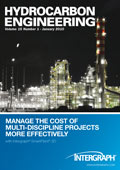Editorial comment
With the global economy stumbling headlong into a brand new decade, albeit with some significant signs of recovery, most notably Asia, it is apparent that a new ‘world order’ is emerging. This has been a process, gradual at first but increasingly rapid, that has evolved over the last decade and was never more evident than at the denouement of the United Nations Climate Change Summit in Copenhagen last month.
Register for free »
Get started now for absolutely FREE, no credit card required.
Despite healthy scepticism before the event, it appeared that months of hard work behind the scenes and growing commitment from a number of key nations including the US and China, should have ensured a formal agreement on global climate change policy. However, with any agreement, according to UN protocol, requiring full consensus from all parties before a binding decision can be reached, the negotiating process was stymied by a group of developing nations. Instead of progressing toward a landmark accord, the process was disrupted and bogged down by a raft of procedural matters. These guerrilla tactics succeeded in derailing the entire process. Despite the hands-on intervention of major world leaders, including President Obama, a loss of momentum at the 11th hour scuppered any chance of achieving an effective global framework for tackling climate change. Instead, a watered down and abbreviated compromise was all that was achieved, leaving countries free to adopt it on a voluntary basis, but not formally endorsed by a unified UN. That this impasse was enacted largely by the ‘Group of 77’, a block of 130 developing countries, is significant. Chaired by Sudan, which along with many of the other member states, has close ties to China, some developed countries have voiced concerns that this resistance to achieving an accord was all carefully orchestrated behind the scenes by the Chinese. Regardless of whether this holds any truth, it was developing nations such as China, Brazil, South Africa, Venezuela and Iran amongst others who, perhaps for the first time at such a high profile gathering, held considerable sway ‘en masse’ in these negotiations, leaving the influence of North America and western Europe palpably weakened.
In reality, it should not be surprising that a new global hierarchy is emerging. The downturn has merely exacerbated it, but it has been in evidence for some time. Whilst the west languishes in the current economic turmoil, Asia’s star has burnt brightest with growth in China, India, South Korea, and Taiwan that few would have believed possible a year ago. Much of this growth has been driven by domestic demand in China and India, which by and large has replaced falling demand in North American and Europe. The statistics are impressive with the Financial Times reporting that South Korea’s exports to China in December rose 94% compared to a year ago and Taiwan’s, in the same period, by 91.2%. This stellar growth is driving economic recovery throughout the whole Asian region.
For the refining industry the same is true. It is no surprise that of the five new refineries to start up in 2009, three of these were in Asia and two in the Middle East. The Asian refineries were the new 580 000 bpd Reliance Industries Ltd refinery in Gujarat, India, China National Petroleum Corp’s 200 000 bpd facility in Dushanzi, China and Vietnam’s first ever refinery (148 000 bpd) at Dung Quat. Total global refinery capacity increased by 1.6 million bpd in 2009. Over 1 million bpd of this increase came solely from the Asia region.*
'The times they are a-changin….'
Happy New Year.
*OGJ Survey of the World’s Refineries 2009.


